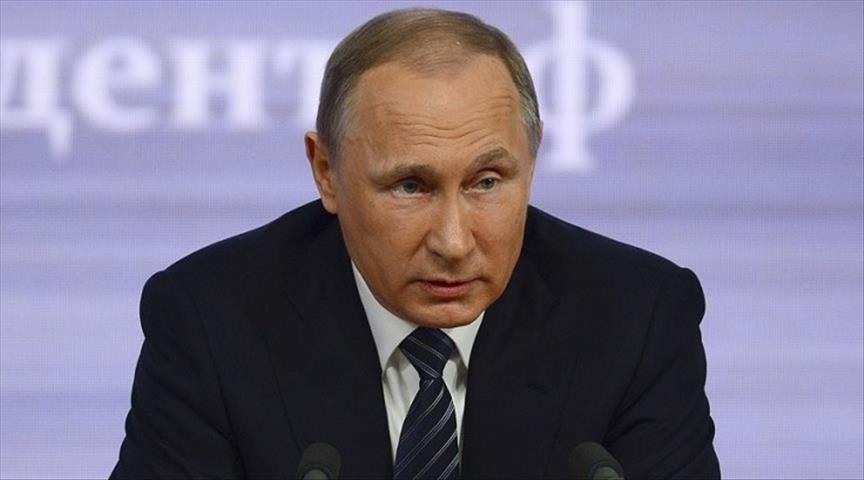Russian President Vladimir Putin’s surprise withdrawal announcement from Syria on Monday is considered a move to preserve his status in the face of dwindling public support for the continuation of Russia's campaign in Syria.
Many experts argue that the decision will have some effects on the Russian economy and on oil prices, but the impact will be minimal.
“This unexpected decision from Mr. Putin is based on a balance of risks and benefits in the Syrian engagement,” Marcel Salikhov, the head of the economics department at the Moscow-based Institute for Energy and Finance told Anadolu Agency.
On Tuesday several Russian bombers and jets reportedly left Syria following Putin’s announcement.
The Russian president said that he will withdraw about half of his forces from Syria while those at the Hmeimim airbase and Tartus port will remain. Russia’s S-400 fourth generation advanced air defense missiles stationed in eastern Mediterranean Sea will also stay in place.
Salikhov asserted that although the military campaign is a burden on the Russian budget, it is not the most significant reason for Russia's withdrawal from Syria.
“The economic aspect of the matter is considered, but I don't think that it's a major factor,” Salikhov said.
He said the growing risk of further casualties is a more important factor in Putin’s decision noting that public support for the Syrian campaign could quickly vanish if more lives are lost.
“The main internal aspect is that Mr. Putin is saying to everybody, including the internal establishment that 'I am in charge. I am the chief of command and I make the decisions,'" Fares Kilzie, chairman of the board of directors at Creon Energy said.
Kilzie said that throughout history political leaders have faced dissent, and in order to avoid this, strong leadership is required to lead a strong military presence. He argues that Putin is asserting his control and calling the shots through his recent move out of Syria.
Kilzie noted the timing of the decision as the Russian economy is feeling the heat from low oil prices and sanctions on the country.
According to information provider IHS, Russia's military budget amounts to around $45 billion per annum, and Russian air strikes in Syria cost Moscow up to $4 million per day.
"The main aim of any movement at this moment for Russia’s political establishment is to fix the main income of Russia, which is dependent on oil and gas,” he said.
Russia is currently in talks with OPEC to create an upward motion in oil prices. Kilzie maintained that Russia could be showing Saudi Arabia, the leader of OPEC, a sign of “goodwill” with its recent withdrawal from Syria to gain more ground in these discussions, as the Saudis were unhappy with Russia’s involvement in Syria.
Major oil producers including Saudi Arabia and Russia, agreed in mid-February to freeze oil output at January levels to stabilize prices. Yet no major change in the supply glut is expected by experts as countries like Iran are unwilling to comply with a production freeze.
Oil producing countries are now expected to further their discussions in a new meeting, which is expected to take place in Qatar on April 17.
“The oil prices may go up, only with the support of the Saudis, with the cut of exports to external markets, the prices may go up by $10 to $15,” Kilzie said.
Oleg Shibanov, the program director of Master of Science in Finance at the Moscow-based New Economy University, notes that the market does not consider the Russian withdrawal as being important for impacting oil prices.
“There is no evidence that the price will stabilize higher than before the announcement, and if there is any effect, it seems it will be negative,” he said.
Underlining that Russia's point was to instigate stability in the Middle East through stopping terrorists in the tracks; Shibanov explained that through the country's attempts at stability, an environment more conducive to lower oil prices would ensue.
The global benchmark Brent crude recorded a 3.7 percent decline on Monday, and lost 3.4 percent Tuesday to a low of $38.33.
Commenting on the ruble’s fate after the withdrawal decision, Shibanov said the Russian currency’s movements were less correlated with oil price fluctuations than in 2015, although both remain somewhat interdependent.
“My expectation is that there will not be much ruble appreciation in 2016,” he added.
The ruble was 1.1 percent weaker against the dollar at 70.72 on Tuesday and lost 1 percent to 78.49 versus the euro.
By Emre Gurkan Abay
Anadolu Agency
gurkan.abay@aa.com.tr


